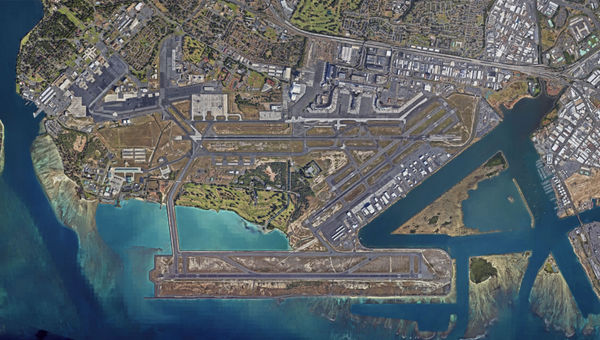Hawaiian Airlines, long the U.S. airline leader in timeliness, saw its on-time performance drop precipitously in 2022 and has continued to struggle thus far this year.
Still, the carrier's COO, Jon Snook, is confident Hawaiian will retake the No. 1 spot once a runway-widening project in progress at Honolulu Airport is complete.
"I have no doubt," Snook said.
Hawaiian led mainline U.S. carriers in on-time performance for 18 years in a row through 2021. That year, the carrier recorded a 90.1% on-time rate under the DOT definition, which includes all flights that arrive within 15 minutes of schedule.
But last year Hawaiian plummeted to fifth in that metric with an on-time rate of 75.8%, DOT statistics show. And through March 24 of this year, according to FlightAware, Hawaiian had logged an on-time performance of just 71.1%.
Snook said the reason for the sudden drop-off is straightforward: The temporary closure last October of Honolulu's primary runway for arrivals, called 8L, for a $103 million widening and resurfacing project.
"It's a painful story, but it's a simple one," he said.
The drop-off does mostly correspond with the runway project timeline. Through July of last year, Hawaiian enjoyed its customary on-time performance position atop the U.S. airline industry, though at 81.9%, the percentage was lower than the carrier's customers had been accustomed to over the years.

Honolulu Airport’s runway 8L has been closed for widening and resurfacing since October, hurting Hawaiian Airlines' on-time performance. Photo Credit: Google Maps
Hawaiian's on-time numbers, relative to its U.S. peers, fell off in August and September, before plummeting in October to 58.2%, worst among the 10 largest mainline U.S. carriers. Hawaiian has struggled operationally ever since, though it is showing improvement. In February, the carrier's flights were on time 74% of the time.
Snook said the closure of runway 8L was initially scheduled to last 120 days, from October through February. Now, according to the DOT, the closure is scheduled to last through May 26.
"As long as it continues, it's really difficult for us to run a dependable airline," Snook said.
Hawaii interisland flights affected
The closure has impacted Hawaiian's operations more than the carrier had anticipated. Snook said that while the project is ongoing the airline had expected an arrival rate on Honolulu's 4R runway, which is receiving most of the flights that would typically land on 8L, of 30 landings per hour. But air traffic controllers have instead been allowing no more than 26 arrivals per hour.
Snook said the challenge is that while 8L runs parallel to the airport's departing runway, 4R traverses that runway diagonally. As a result, potential conflicts between arrivals and departures have led Hawaii's air traffic controllers to space arriving aircraft further apart than normal.
Beyond that, Snook said, when the system backs up, controllers clear transpacific flights from Asia and the U.S. mainland for landing, while holding flights from other portions of the Hawaiian Islands. That's a big problem for Hawaiian, which flies approximately 160 interisland flights per day. In a statement, the FAA confirmed that it is taking that approach.
"When there is a high volume of transpacific arrivals, the FAA's Honolulu Control Facility holds the interisland traffic until there is room on the runway," the agency said. "The FAA gives landing preference to planes that have been airborne for many hours to avoid fuel issues."
Hawaiian, said Snook, has adjusted to the situation by adding slack to flight schedules. But that's only proven partially effective, since there's no way to predict when the flight holds will be called. Some days, the FAA issues very few holds, while many holds are issued on other days.
"I know that the underlying operation is more than capable of returning to the top of the industry," Snook said. "We just need to grind through the next couple months."